Position of Lord Shiva

I am always engaged in offering obeisances to Lord Vasudeva in pure Krishna consciousness. Krishna consciousness is always pure consciousness, in which the Supreme Personality of Godhead, known as Vasudeva, is revealed without any covering.
[Srimad Bhagavatam 4:3:23: Lord Shiva to his wife, Sati]
In another place in the Srimad Bhagavatam, when Lord Shiva was bewildered by the Supreme Lord’s form as a beautiful woman, Mohini-Murti, Lord Shiva admits his weakness in being unable to fully understand the illusory nature of this material creation:
O My Lord, I, who am considered to be the best of the demigods, and Lord Brahma and the great rishis, headed by Marichi, are born of the mode of goodness. Nonetheless, we are bewildered by Your illusory energy and cannot understand what this creation is. Aside from us, what is to be said of others, like the demons and human beings, who are in the base modes of material nature [rajo-guna and tamo-guna]? How will they know You?
[Srimad Bhagavatam 8:12:10]
Later in the same chapter, Lord Shiva, who is often pictured in meditation, explains to his wife who it is that he meditates on while in trance. He says:
O Goddess, You have now seen the illusory energy of the Supreme Personality of Godhead, who is the unborn master of everyone. Although I am one of the principal expansions of His Lordship, even I was illusioned by His energy. What then is to be said of others, who are fully dependent on maya? When I finished performing mystic yoga for one thousand years, you asked me upon whom was I meditating. Now, here is the Supreme Person to whom time has no entrance and who the Vedas cannot understand.
[Srimad Bhagavatam 8:12:43-44]
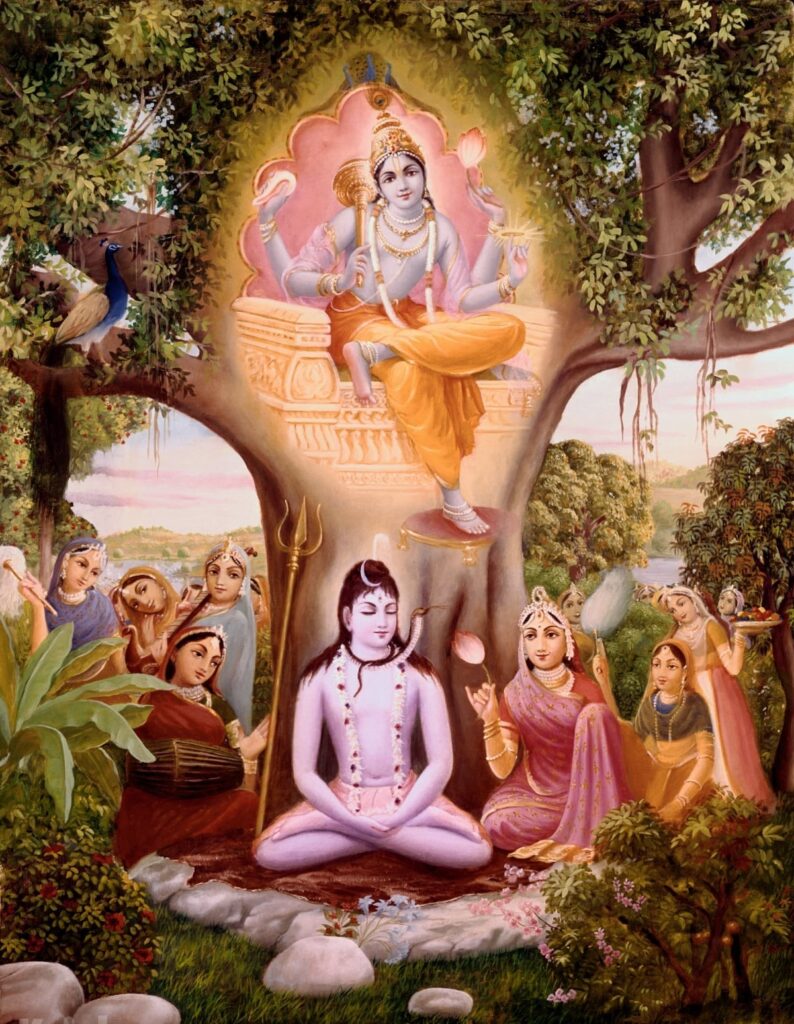
Another time when Lord Shiva described his subservient position was when Lord Krishna was battling with Banasura, a powerful and demoniac king. Banasura was a devotee of Lord Shiva and he had been granted great mystic powers by Lord Shiva. When it looked like Banasura was about to lose his life, Lord Shiva, who had also been a part of the battle scene, approached Lord Krishna to pacify Him. Lord Shiva requested that Krishna spare Banasura’s life. This is related in Srimad Bhagavatam 10:63:34-45:
Sri Rudra (Lord Shiva) said: You alone are the Absolute Truth, the supreme light, the mystery hidden within the verbal manifestation of the Absolute. Those whose hearts are spotless can see You, for You are uncontaminated, like the sky.
[Srimad Bhagavatam 10:63:34]
In the verses that follow, Lord Shiva continues to address Lord Krishna in a subservient and worshipful way:
Your current descent into the material realm, O Lord of unrestricted power, is meant for upholding the principles of justice and benefitting the entire universe. We demigods, each depending on Your grace and authority, develop the seven planetary systems. You are the original person, one without a second, transcendental and self-manifesting. Uncaused, you are the cause of all, and You are the ultimate controller.
[Srimad Bhagavatam 10:63:37-38]
Elsewhere in Srimad Bhagavatam, when Uddhava was praying to Lord Krishna, he said:
Even Lord Brahma and Lord Shiva act only as Your instruments in cosmic creation and annihilation, which are ultimately done by You, The Supreme Lord, in Your invisible aspect of time.
[Srimad Bhagavatam 10:71:8]
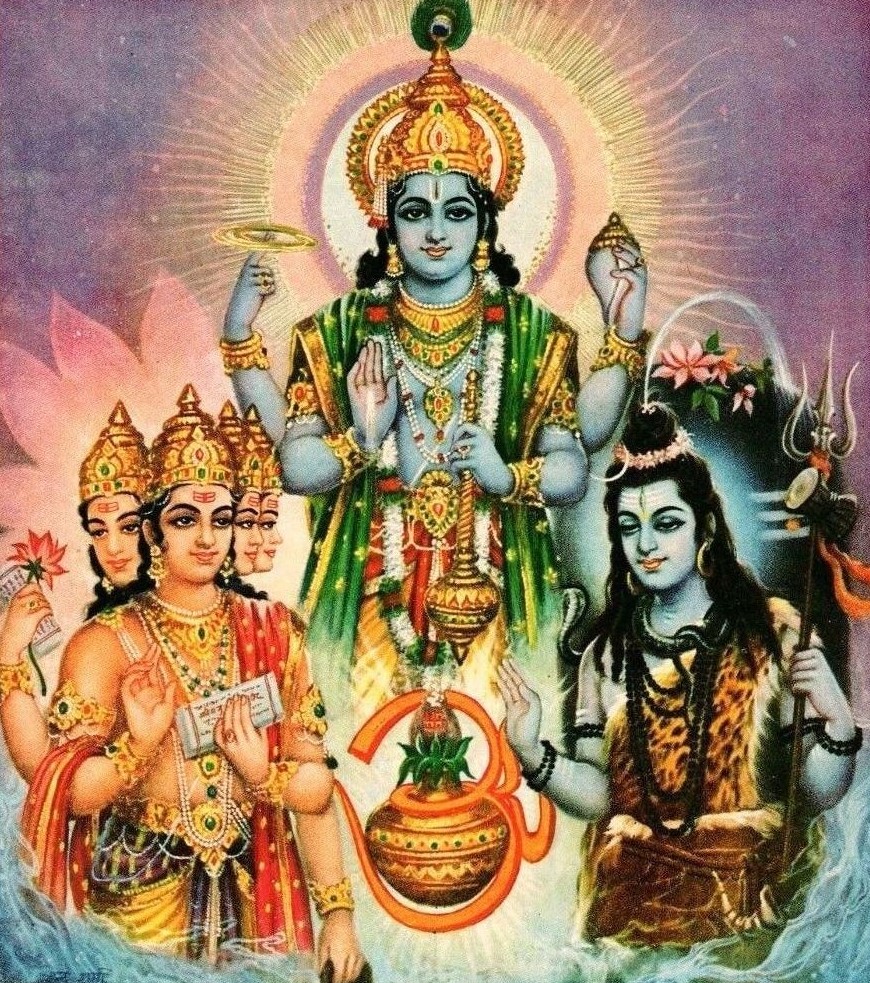
In Bhagavad-gita, it is described that Lord Shiva is part of Krishna’s universal form [Virata-rupa]:
At that time Arjuna could see in the universal form of the Lord the unlimited expansions of the universe situated in one place although divided into many, many thousands. Then, bewildered and astonished, his hair standing on end, Arjuna began to pray with folded hands, offering obeisances to the Supreme Lord.
Arjuna said: My dear Lord Krishna, I see assembled together in Your body all the demigods and various other living entities. I see Brahma sitting on the lotus flower as well as Lord Shiva and many sages and divine serpents.
O Lord of the universe, I see in Your universal body many, many forms – bellies, mouths, eyes – expanded without limit. There is no end, there is no beginning, and there is no middle to all this. Your form, adorned with various crowns, clubs and discs, is difficult to see because of its glaring effulgence, which is fiery and immeasurable like the sun.
You are the supreme primal objective; You are the best in all the universes; You are inexhaustible, and You are the oldest; You are the maintainer of religion, the eternal Personality of Godhead.
[Bhagavad-gita 11:13-18]
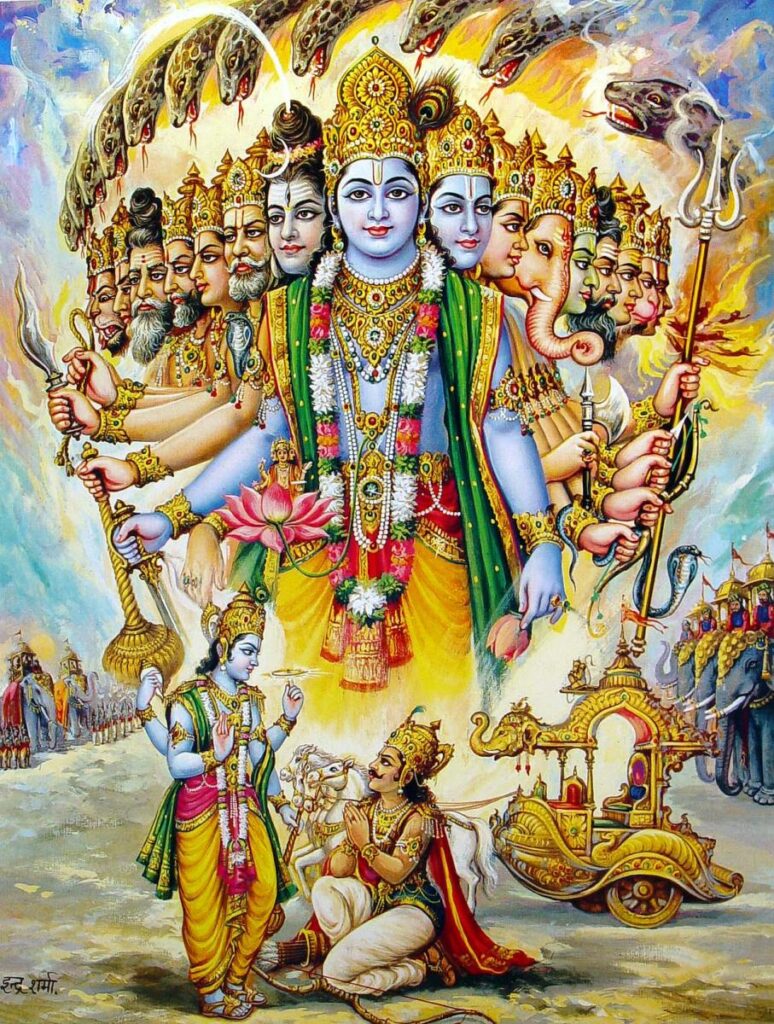
Lord Shiva’s position is a bit hard to understand. He is in a category all of his own. He is above the other demigods like Indra and Lord Brahma. The other demigods are jiva souls who are empowered in various ways by Lord Vishnu (Krishna) for the administration of the material world. But Lord Shiva is above them all. He is practically on the same level as Lord Vishnu Himself. Still, a distinction exists, for Lord Shiva is directly in touch with the material energy whereas Lord Vishnu is always beyond it.
The Brahma-samhita gives the example that Lord Vishnu is like milk whereas Lord Shiva is like yogurt. In one sense there is no difference between yogurt and milk. But milk is the original substance and yogurt is a transformation of milk. So Lord Shiva is a transformation of Lord Vishnu in charge of the mode of ignorance and entrusted with the destruction of the lower planets of the cosmic manifestation at the end of each day of Brahma, and at the final dissolution of the cosmos when Brahma and associates return to the spiritual world. Lord Shiva may properly be regarded as being non-different from Lord Vishnu, because Lord Shiva is an incarnation of Lord Vishnu for performing specific functions.
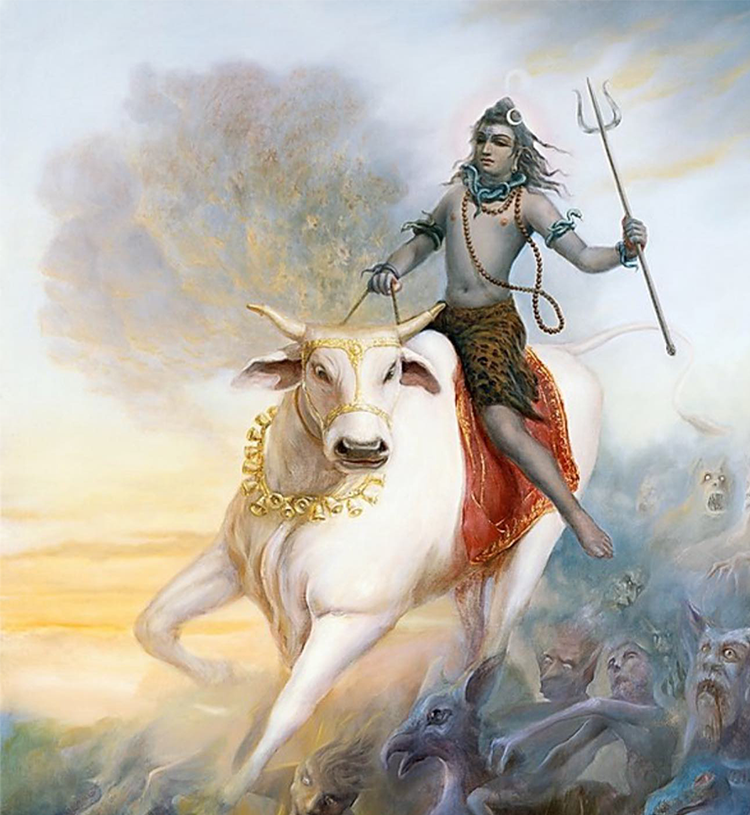
So when Lord Shiva is glorified as the Supreme Lord (Mahadeva) the glorification is in one sense not incorrect because Lord Shiva is the most highly empowered and exalted representative of Lord Vishnu. According to the Srimad Bhagavatam, Lord Shiva is the greatest of all Vaisnavas, or devotees of Lord Vishnu or Krishna:
Just as the Ganga is the greatest of all rivers, Lord Acyuta [Krishna] the supreme among deities and Lord Shambhu [Shiva] the greatest of Vaisnavas, so Srimad Bhagavatam is the greatest of all Puranas.
[Srimad Bhagavatam 12:13:16]
Vaisnavas, devotees of Lord Vishnu or Lord Krishna, have great respect for Lord Shiva for this reason. But Lord Shiva is certainly not the cause of all causes, or the origin of all. This is Lord Krishna’s position alone:
Krishna, Who is known as Govinda, is the Supreme Godhead. He has an eternal blissful spiritual body. He is the origin of all. He has no other origin and He is the prime cause of all causes.
[Brahma Samhita 5:1]
Lord Shiva Comes to Visit Baby Krishna
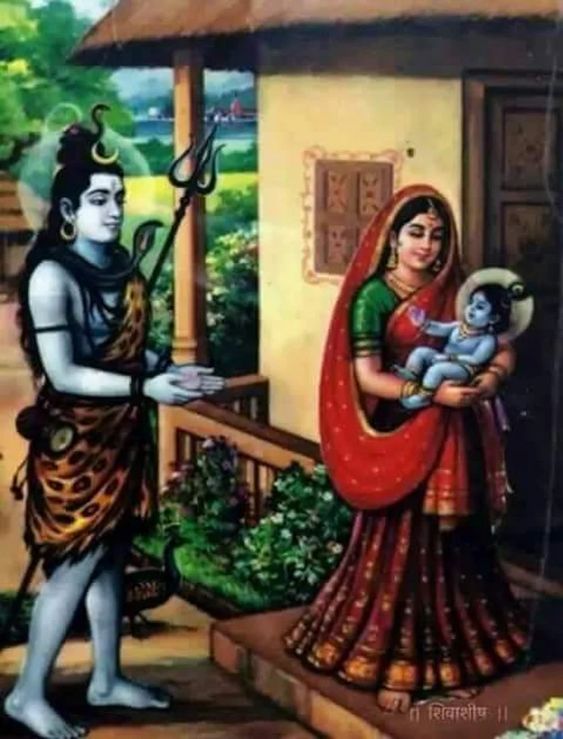
Once Lord Shiva appeared at Nanda Maharaj’s doorsteps, desiring to take darshan of little Gopal, the Lord of his life. Lord Shiva’s body was smeared with ashes from a crematorium and clad in a tiger skin. His long hair was matted and unkempt. He wore a live serpent necklace, was garlanded with skulls and carrying a trident and his small damaru drum.
Lord Krishna was performing His playful childhood pastimes in the courtyard of Nanda Maharaj’s palace, but when Lord Shiva came to the door, Mother Yasoda was alarmed to see this fierce looking yogi with crematorium ashes all over his body, snake garland and skulls.
“What do you want?” Yasoda asked. Lord Shiva said, “O Mother, I want to see your son.” Yasoda became fearful and said, “No, no, that is impossible. If my little boy sees you with snakes, ashes and trident, He will become afraid and start crying.” Lord Shiva then begged and pleaded. Vrindavan is a place of such special sweetness that Lord Shiva, the destroyer of the cosmic manifestation, was desperately pleading, taking a humble subordinate position to Mother Yasoda, a simple cowherd woman.
Due to strong protective instincts springing from her intense maternal affection, Mother Yasoda reluctantly told Lord Shiva to go away. And so, with great disappointment, Lord Shiva went into the forest and started meditating deeply on his dear Lord Krishna’s beautiful Bal Gopal form and His sweet Vrindavan pastimes. Lord Shiva, who is known as Mahadeva, the most powerful of all demigods, began to pray for the darshan of sweet Gopal.
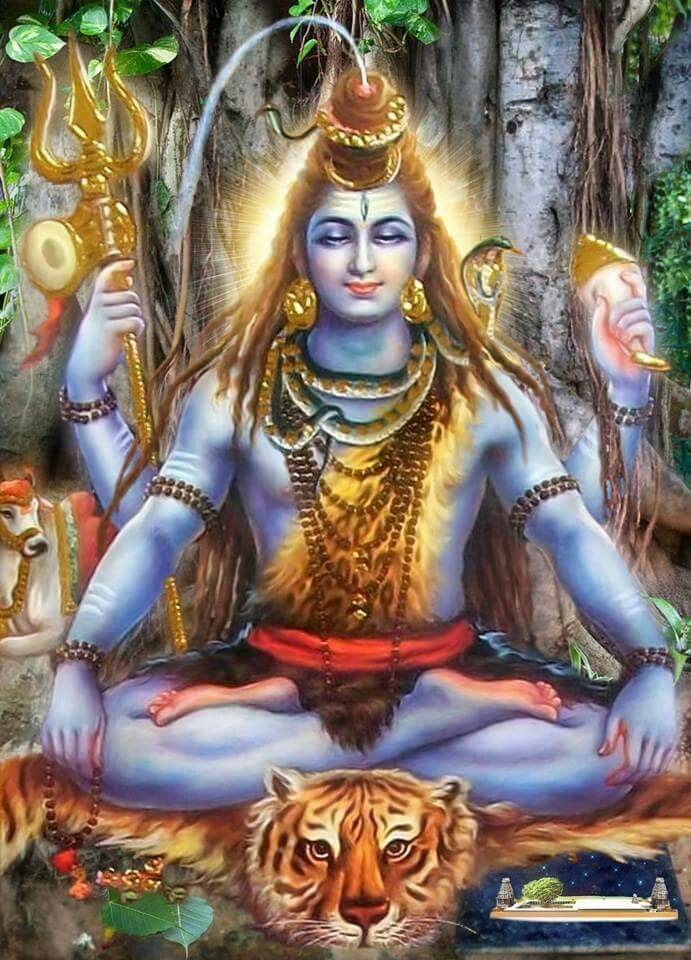
Lord Krishna, understanding His devotee’s heart, began to cry incessantly in the home of Nanda Maharaj. There was nothing that Mother Yasoda or any of the gopis could do to make Him stop crying. The gopis, feeling great concern, pondered what had happened to so upset Krishna who was the lord of their lives. And Mother Yasoda then thought, “Perhaps I committed a grave offence by refusing the wishes of that yogi. One should never disrespect a holy man. Perhaps this is why my child is crying.”
Mother Yasoda immediately sent some of her gopi friends into the forest, requesting of them, “Please go and find that yogi and bring him back here.” Accepting with great happiness the invitation of the gopis, Lord Shiva again appeared at Nanda Maharaj’s door. And this time Mother Yasoda welcomed him warmly and brought him into Nanda Maharaj’s house. At this time, Lord Shiva’s heart-felt desires and prayers were answered, and he had the darshan [holy viewing] of his beautiful Lord Krishna.
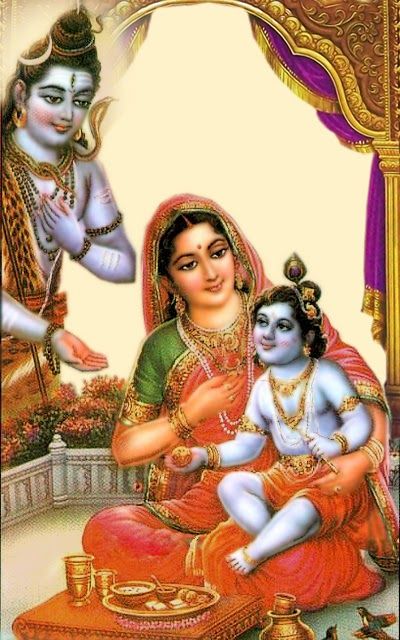
Krishna had been constantly crying up to this point, but when He saw Lord Shiva He remembered Shiva chanting His holy names with great relish while he played his transcendental damaru drum, and young Krishna smiled sweetly. Seeing her young child happy once again, Mother Yasoda, who only wants the pleasure of Krishna, requested of Lord Shiva, “Will you kindly stay here forever? You make my son so happy.”

Lord Shiva is also known as Ashutosh, meaning “One who is easily satisfied.” He replied, “I will stay on three conditions. Firstly, I wish to see the child’s beautiful pastimes. Secondly, whenever you bathe Him, you must give me caranamrita, the nectarean waters that have bathed His lotus feet. And finally, whenever you feed Him, please give me some of His remnants.”
Vajranabha, Lord Krishna’s great-grandson, established a Shiva lingam deity in Nandagram [the township of Nanda Maharaj] called the Nandeshwar Mahadev. And even today, after offerings are made first to Lord Krishna, caranamrita and maha-prasadam are brought and offered to Nandeshwar Mahadev. Five thousand years later, the promise of Mother Yasoda is still being honoured in Braja mandala.
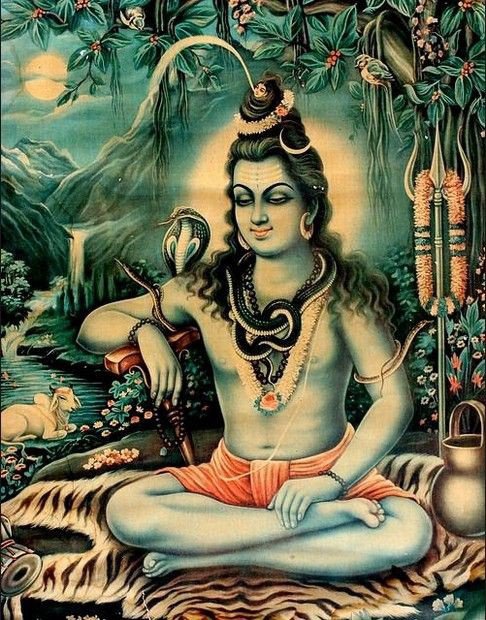

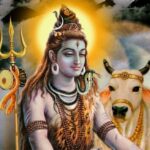
Leave A Reply